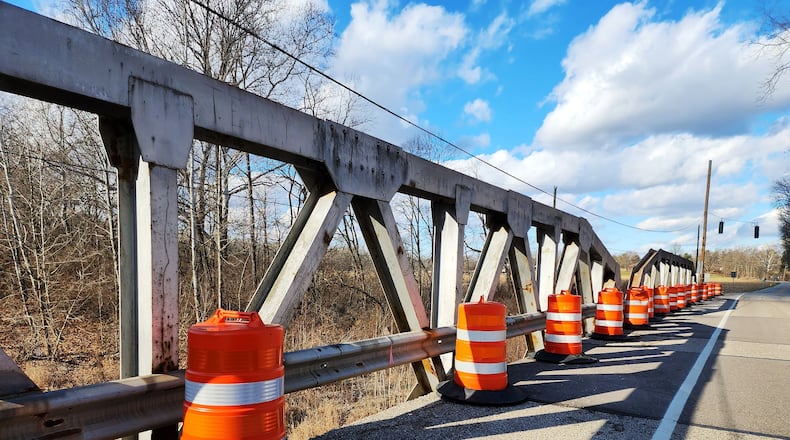He credited the American Rescue Plan Act for the robust program this year, but tempered the good news with the fact costs have gone up dramatically.
“We’re buying less with what we’ve got and that’s a concern as we look forward,” Wilkens said. “Thanks to the ARPA money we’ve seen almost a 231% increase in what the townships normally do. That’s between their ARPA money and the ARPA money you provided for them, it’s almost double their paving, our paving has held the same.”
In 2020, the county paid $166,793 per mile, this year it is paying $249,992 per mile, which is nearly a 50% increase.
Many of the townships elected to use their own federal windfall on roads and the commissioners allocated $10 million — $5 million each for this year and next — of their ARPA money for paving projects.
Wilkens is responsible for improving and maintaining county-owned roads but also bids and supervises township bridge, culvert and road projects. Those jurisdictions pay for the projects within their territories. Cities and the state handle their own roads.
Bridge repairs are another focus this year with $7 million budgeted to address four bridges. Work has already begun on the $2 million Elk Creek Road bridge, and the most expensive project is $3.4 million for the Princeton Road bridge in Liberty Twp. That project is being done in conjunction with the new roundabout at Princeton and Mauds Hughes for a total cost of $4.6 million.
The estimated 7-month long project will require detours.
“We just finished Hamilton Mason Road and Mauds Hughes which is an area that connects on the other end of this, I imagine the residents of Liberty Twp. are going to be a little upset over the continued closures,” Wilkens said. “But the funding worked out ... that we got this funding right on the heels of the other one.”
Wilkens has been extremely successful culling outside funding for projects, and on this one, the federal government is paying the entire bill on the roundabout portion and the state is paying $1.5 million for the bridge. He collected $12.5 million in grants overall to help pay for the projects this year and $18 million from other jurisdictions and county sources like the county and West Chester Twp. TIFs.
The county’s TIF funded almost half the $24.5 million cost of the Liberty Way interchange project at Interstate 75 — $11.6 million came from federal government and $1.1 million from the state — and the West Chester TIF is paying nearly all of the $2 million roundabout at Tylersville and Beckett roads, among other projects.
“If we didn’t have the TIFs in place in West Chester and the one the commissioners put in, this would be a different conversation,” Wilkens said. “The reality of those TIFs enable us to keep up with the growth we’ve seen in Liberty and West Chester, it’s our salvation. Without that that money we’d be moving back to the Dark Ages.”
There is another new roundabout going in at Stahlheber and Morman roads at an estimated cost of $1.4 million. Commissioner T.C. Rogers asked if this was an easier project, since roundabouts have been running in the $2 million range. Wilkens said this one is in a rural area so it doesn’t require a lot of utility relocation and other complications so so it is cheaper.
However, he said back when they started building roundabouts, the cost was about $750,000, “and you see what’s happened, that’s the fear looking forward, this isn’t the end ... I’m really concerned our buying power is going down.”
The largest improvement projects
There are three major roadway improvements, the most expensive is estimated at $6.1 million to widen and improve drainage on Crescentville Road in West Chester Twp. — the cost is going to be shared between the federal government, Greater Cincinnati Water Works, West Chester, Sharonville, Springdale and the county. Wilkens said this project has been in discussion for 20 to 25 years, “it’s been a long haul to get there.”
The final phase of the massive $32 million Liberty Way interchange improvement is scheduled for this year and includes additional turn lanes at Liberty Way and Cox Road, with a price tag of $2.8 million. The overpass reconfiguration and new roundabout at Veterans Boulevard are complete — some final touches such as paving will also be done in the spring. Wilkens estimated it should be complete by late summer.
The final roadway improvement is widening Tylersville Road from Lakota Hills Drive to Lakota Springs Drive at a cost of $2.3 million. It involves adding a center turn lane through that stretch of road.
Commissioner Cindy Carpenter said she often gets questions about how the roadwork is funded and noted they are not the commissioners’ responsibility.
“What you do with the funds that you receive, and how you go out and get your matching money, and how you go out and secure these grants, is pretty much unheard of in any other county engineer in the state of Ohio,” Commissioner Don Dixon said. “It’s just amazing what you do with what you’ve got.”
HOW ROADWORK IS FUNDED
Aside from federal and state grants and TIFs, the majority of the Butler County Engineer’s Office’s $16 million office budget is funded through license plate fees and gas taxes.
About the Author

